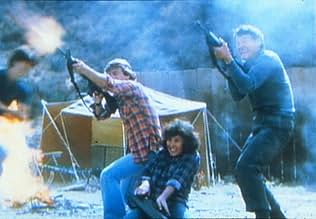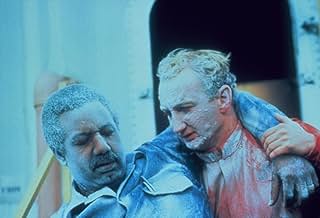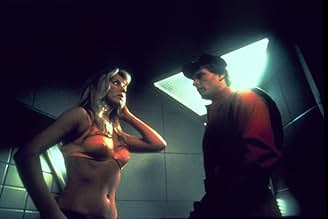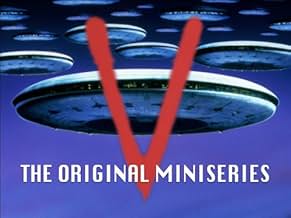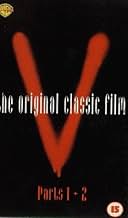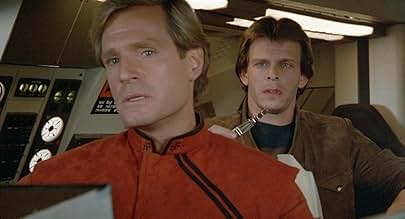A seemingly peaceful alien race, arrives at earth and asks for help to ensure their own planets survival. However, the visitors agenda turns out be much darker.A seemingly peaceful alien race, arrives at earth and asks for help to ensure their own planets survival. However, the visitors agenda turns out be much darker.A seemingly peaceful alien race, arrives at earth and asks for help to ensure their own planets survival. However, the visitors agenda turns out be much darker.
- Nominated for 2 Primetime Emmys
- 1 win & 4 nominations total
Browse episodes
Featured reviews
If a ninety-nine out of a hundred science fiction films fall into being cliché ridden, one will stand out above the rest. V, in its original miniseries, would be one of those that stands above the rest. V is anything but your typical science fiction story of an alien invasion. It is a tale of a fascist (alien) takeover of our society and the resistance of a few in a society to it. As a result V, while a product of the technology and culture of the 1980's, is a timeless piece of science fiction.
One of the elements to V's success is its cast. Leading, so to speak, the cast of human characters are Marc Singer as cameraman Mike Donovan and Faye Grant as med-student turned rebel leader Julie Parrish. Both Singer and Grant give nice performances that, for the most part, come across as real people in extraordinary situations. In fact the performances of the entire cast be described by that last phrase as well ranging from the Maxwell family (Michael Durrell, Penelope Windust as the parents with Blair Tefkin, Viveka Davis and Marin May as their daughters) who find themselves persecuted to the point of joining the resistance much like the Taylor family (Jason Bernard, Richard Lawson and Michael Wright) to the Bernstein family (George Morfogen, Bonnie Bartlett) who find themselves torn between their Visitor friendly son Daniel (David Packer) and the Holocaust survivor grandfather Abraham (Leonardo Cimino). In fact the single best scene involves Abraham, who is wanting to hide the persecuted Maxwell's, reminding his son that this whole situation is all too familiar for the consequences of them not being hidden means "we haven't learned a thing". This is a scene that is not only well acted and well written but incredibly rare in your average science fiction story as well. There's also many other fine members of the cast including Neva Patterson (Donovan's mom), Evan Kim (Donovan's camera partner Tony), Jenny Sullivan (reporter turned Visitor spokeswoman Kristine Walsh) and Kristine Walsh (as Gardener turned rebel Sancho) amongst many others. The human side of the cast is just the tip of the iceberg though.
There's also a fine cast playing the alien "visitors" as well. They range from their seemingly benevolent leader John (played briefly and well by Richard Herd) to Andrew Prine as the authoritative Steven. Then there's the innocent abroad in the form of Robert Englund as Willie and the resistance from within the visitors themselves in the form of Frank Ashmore as Martin and Jenny Neumann as Barbara. Then there is Jane Badler as Diana, perhaps the most attractive and conniving of the alien visitors, who plays the role with a seriousness not usually found in this kind of role. Together they form one of the best, and definitely one of the most diverse, cast of alien invaders ever assembled.
V is also aided by fine work behind the camera. There's the cinematography of John McPherson especially the tracking shot of characters watching the first contact sequence and the scenes in the mother-ship. The production design in the form of the mother ship interiors are fine examples of science fiction sets. There's also the special effects work ranging from the excellent shots of mother-ships (a decade plus before Independence Day) to the aerial dogfight at the end which all work marvelously for the most part despite a very few shots which don't look quite finished. No review of V is complete without mentioned the fine prosthetic work of the miniseries which range from the Visitors true faces to some rather uncomfortable dining sequences. Last, but not least by any means, is the fine score by composer Joe Harnell which takes puts together classical music influences and choir in one of the most unusual and best scores produced for any science fiction television piece I have heard, especially for the opening and closing credits of any part. In short: strong production values go a long way.
To my mind V's ultimate success lies in the script and direction of Kenneth Johnson. V was originally conceived not as a science fiction tale of alien invasion but as the tale of a fascist takeover of the U.S which can still be found deeply embedded in the final product. In fact that is what separates V from many other alien invasion stories. V is about fascism, how people can be lured in by it, how far those in power will go to secure their position, how the average person will react and what happens when ordinary people stand up to resist it. There's also more then a few hints of Nazi Germany as well from the Swastika-like symbol of the Visitors to Friends of the Visitors youth groups (the Hitler Youth) and, before the miniseries is over with, a strong allegory with the Holocaust as well (see the miniseries to get it). Wisely Johnson also puts a fair (but not gratitude) amount of action in as well which helps to compliment the story and move it along. V is embedded in the technology and culture of the 1980's when it was made to sure but that doesn't date the story at all. Instead V becomes, like H.G. Welles War of the Worlds before it, a timeless tale of alien invasion and human resistance to it.
What makes V successful? Well it's large cast of fine actors, nice cinematography, good special effects work, excellent prosthetic work and fine score go along way. Yet the true success of V lies in its script and story. Why? Because ultimately V is not about spaceships and ray-guns but is about people and their reactions to the extraordinary events around them.
One of the elements to V's success is its cast. Leading, so to speak, the cast of human characters are Marc Singer as cameraman Mike Donovan and Faye Grant as med-student turned rebel leader Julie Parrish. Both Singer and Grant give nice performances that, for the most part, come across as real people in extraordinary situations. In fact the performances of the entire cast be described by that last phrase as well ranging from the Maxwell family (Michael Durrell, Penelope Windust as the parents with Blair Tefkin, Viveka Davis and Marin May as their daughters) who find themselves persecuted to the point of joining the resistance much like the Taylor family (Jason Bernard, Richard Lawson and Michael Wright) to the Bernstein family (George Morfogen, Bonnie Bartlett) who find themselves torn between their Visitor friendly son Daniel (David Packer) and the Holocaust survivor grandfather Abraham (Leonardo Cimino). In fact the single best scene involves Abraham, who is wanting to hide the persecuted Maxwell's, reminding his son that this whole situation is all too familiar for the consequences of them not being hidden means "we haven't learned a thing". This is a scene that is not only well acted and well written but incredibly rare in your average science fiction story as well. There's also many other fine members of the cast including Neva Patterson (Donovan's mom), Evan Kim (Donovan's camera partner Tony), Jenny Sullivan (reporter turned Visitor spokeswoman Kristine Walsh) and Kristine Walsh (as Gardener turned rebel Sancho) amongst many others. The human side of the cast is just the tip of the iceberg though.
There's also a fine cast playing the alien "visitors" as well. They range from their seemingly benevolent leader John (played briefly and well by Richard Herd) to Andrew Prine as the authoritative Steven. Then there's the innocent abroad in the form of Robert Englund as Willie and the resistance from within the visitors themselves in the form of Frank Ashmore as Martin and Jenny Neumann as Barbara. Then there is Jane Badler as Diana, perhaps the most attractive and conniving of the alien visitors, who plays the role with a seriousness not usually found in this kind of role. Together they form one of the best, and definitely one of the most diverse, cast of alien invaders ever assembled.
V is also aided by fine work behind the camera. There's the cinematography of John McPherson especially the tracking shot of characters watching the first contact sequence and the scenes in the mother-ship. The production design in the form of the mother ship interiors are fine examples of science fiction sets. There's also the special effects work ranging from the excellent shots of mother-ships (a decade plus before Independence Day) to the aerial dogfight at the end which all work marvelously for the most part despite a very few shots which don't look quite finished. No review of V is complete without mentioned the fine prosthetic work of the miniseries which range from the Visitors true faces to some rather uncomfortable dining sequences. Last, but not least by any means, is the fine score by composer Joe Harnell which takes puts together classical music influences and choir in one of the most unusual and best scores produced for any science fiction television piece I have heard, especially for the opening and closing credits of any part. In short: strong production values go a long way.
To my mind V's ultimate success lies in the script and direction of Kenneth Johnson. V was originally conceived not as a science fiction tale of alien invasion but as the tale of a fascist takeover of the U.S which can still be found deeply embedded in the final product. In fact that is what separates V from many other alien invasion stories. V is about fascism, how people can be lured in by it, how far those in power will go to secure their position, how the average person will react and what happens when ordinary people stand up to resist it. There's also more then a few hints of Nazi Germany as well from the Swastika-like symbol of the Visitors to Friends of the Visitors youth groups (the Hitler Youth) and, before the miniseries is over with, a strong allegory with the Holocaust as well (see the miniseries to get it). Wisely Johnson also puts a fair (but not gratitude) amount of action in as well which helps to compliment the story and move it along. V is embedded in the technology and culture of the 1980's when it was made to sure but that doesn't date the story at all. Instead V becomes, like H.G. Welles War of the Worlds before it, a timeless tale of alien invasion and human resistance to it.
What makes V successful? Well it's large cast of fine actors, nice cinematography, good special effects work, excellent prosthetic work and fine score go along way. Yet the true success of V lies in its script and story. Why? Because ultimately V is not about spaceships and ray-guns but is about people and their reactions to the extraordinary events around them.
10JRmf
First saw 20 years ago and its fascination to me then has not dimmed.
Skillfully told tale of alien contact - "we come in peace" but this soon changed as a deep and premeditated plot by the aliens to enslave/rape the Earth emerged. Obvious overtones common to any invader/oppressive regime in particular The Holocaust.
Strong storyline and characters that one really felt involved with/cared for.
Special effects (especially the at-times wobbly V shuttle craft) not state-of-the-art by today's standards but competently done and more than compensated for by the strength of the storyline.
Would recommend to people who don't particularly like sci-fi, because of the personal side of the story.
10 out of 10.
Skillfully told tale of alien contact - "we come in peace" but this soon changed as a deep and premeditated plot by the aliens to enslave/rape the Earth emerged. Obvious overtones common to any invader/oppressive regime in particular The Holocaust.
Strong storyline and characters that one really felt involved with/cared for.
Special effects (especially the at-times wobbly V shuttle craft) not state-of-the-art by today's standards but competently done and more than compensated for by the strength of the storyline.
Would recommend to people who don't particularly like sci-fi, because of the personal side of the story.
10 out of 10.
Considered by many to be one of the best in the genre, V is a television classic.
Airing during 'May Sweeps' on NBC over two nights, the mini-series was a surprise ratings smash. Critically praised for it's introspective tale with strong themes, the special effects were top-notch, particularly for television of the time.
NBC had taken a gamble with this cutting-edge, creative, and creepy alien-invasion story that pays off in some memorable performances from members of the large cast.
Twenty-plus years later, Kenneth Johnson's epic V holds up extremely well, it's message of resistance and sacrifice being ever more relevant in this Post- 9/11 world.
Airing during 'May Sweeps' on NBC over two nights, the mini-series was a surprise ratings smash. Critically praised for it's introspective tale with strong themes, the special effects were top-notch, particularly for television of the time.
NBC had taken a gamble with this cutting-edge, creative, and creepy alien-invasion story that pays off in some memorable performances from members of the large cast.
Twenty-plus years later, Kenneth Johnson's epic V holds up extremely well, it's message of resistance and sacrifice being ever more relevant in this Post- 9/11 world.
1983 was perhaps the peak year for the TV mini-series, with The Thorn Birds, The Winds of War and V all premiering to big ratings. V features a worldwide alien invasion, as huge, circular motherships arrive and take up stationary orbit all over the planet, directly over large cities. The media soon dubs them the "Visitors", and they appear human, although sensitive to the light and with strange voices. They seem to be benevolent at first, sharing medical and technological breakthroughs, while not asking for anything in return. But of course they are after something, and they will stop at nothing to get it, and soon they are disposing of enemies and setting up human collaboration units to weed out the "undesirables". A group of people soon set up an underground resistance, but can they hope to stop the seemingly superior alien invaders?
Marc Singer stars as a heroic war correspondent who is the first to learn of the aliens true nature, along with Faye Grant as a biologist, Jane Badler as an alien commander, Richard Herd, Andrew Prine, Leonardo Cimino as a Holocaust survivor who sees the writing on the wall, Evan Kim, Michael Wright, Bonnie Bartlett, Neva Patterson, Robert Englund as a friendly alien, and many more.
This was probably intended as a starting point for a series, but instead it led to another mini-series the following year, before finally a short-lived series (and a remake in 2009). It's derivative of a lot of things, namely the Arthur C. Clarke novel Childhood's End. It's also a very heavy-handed allegory of the Nazi occupations in Europe and the Holocaust; the alien symbol is even a variation on a swastika. The effects are decent, if dated at this point, and the script, by writer-director Kenneth Johnson, never really rises above average. But it's fun in a dopey, Saturday-morning serial way. At slightly over 3 hours, it's also a bit short as far as mini-series go.
Marc Singer stars as a heroic war correspondent who is the first to learn of the aliens true nature, along with Faye Grant as a biologist, Jane Badler as an alien commander, Richard Herd, Andrew Prine, Leonardo Cimino as a Holocaust survivor who sees the writing on the wall, Evan Kim, Michael Wright, Bonnie Bartlett, Neva Patterson, Robert Englund as a friendly alien, and many more.
This was probably intended as a starting point for a series, but instead it led to another mini-series the following year, before finally a short-lived series (and a remake in 2009). It's derivative of a lot of things, namely the Arthur C. Clarke novel Childhood's End. It's also a very heavy-handed allegory of the Nazi occupations in Europe and the Holocaust; the alien symbol is even a variation on a swastika. The effects are decent, if dated at this point, and the script, by writer-director Kenneth Johnson, never really rises above average. But it's fun in a dopey, Saturday-morning serial way. At slightly over 3 hours, it's also a bit short as far as mini-series go.
"V" is one of those rare TV miniseries that manages to contain action, decent special effects (especially for 1983), and a storyline that actually makes you think. It's not without flaws, but if you overlook its faults, this miniseries can be both entertaining and thought-provoking.
Yes, yes, Kenneth Johnson went over the top with the Visitors' similarities to the Nazis, right down to their "symbol". Yes, there were a few continuity errors and plot points that didn't quite make sense. Yes, you had to suspend your sense of believability in various aspects of the film. However...
The miniseries did a good job portraying a lot of interesting character stories and traits that you don't otherwise find in most action films. Consider the following:
1) Mike Donovan's relationship with his mother was complex and interesting in itself. Donovan's mother, who had apparently been through a tough life, desired power and the ability to live "the good life" so much that she literally closed her eyes to everything that was happening around her. Even the Visitors' kidnapping of her only grandchild didn't faze her. Eventually she completely turned on Mike, and finally turned on her Visitor friend at the end when it appeared the Visitors were losing the war. This sort of character is very real, and I'm sure all of us know people who will switch allegiances at the drop of a hat.
2) The depiction of both earth people who assist the Visitors and the Visitor "5th Column", who are secretly sabotaging their people's own mission, provides us with good examples of people turning on their own kind for reasons of greed or morality.
3) The Daniel Berstein character, obviously looking for direction in life, never quite fitting in with the 1980s earth world, was fascinating. It was totally believable how he fell in with the Visitors and became an officer in their army, just to feel like he belonged. Even the torture of his parents and murder of his grandfather only lightly affected him.
4) The internal squabbling between the Visitor high command was also interesting, especially given that they all generally had the same goal. Diana wanted the mission to proceed as more of a giant scientific experiment, while other Visitor higher-ups wanted it to be strictly a military mission.
Sadly, Kenneth Johnson was not involved with V:The Final Battle, and it showed. The Final Battle was more of a pure action film, while the original V was a lot deeper. Remember the "message" that the humans sent to the Visitor's "enemy", asking for help? Notice that was never referenced again in the Final Battle. Twenty years later, Johnson is picking up where he left off! "V" is going to have a sequel, but it will essentially ignore The Final Battle and pretend it didn't exist. Instead, the humans will be assisted by the Visitors' enemy, who I presume got the message. I hope this miniseries actually gets off the ground and appears on TV. I'd love to see what Johnson can do with it. Supposedly Jane Badler, Marc Singer, and Faye Grant will reprise their roles. I don't understand how they can do such a thing, all being 20 years older. We'll see...
Yes, yes, Kenneth Johnson went over the top with the Visitors' similarities to the Nazis, right down to their "symbol". Yes, there were a few continuity errors and plot points that didn't quite make sense. Yes, you had to suspend your sense of believability in various aspects of the film. However...
The miniseries did a good job portraying a lot of interesting character stories and traits that you don't otherwise find in most action films. Consider the following:
1) Mike Donovan's relationship with his mother was complex and interesting in itself. Donovan's mother, who had apparently been through a tough life, desired power and the ability to live "the good life" so much that she literally closed her eyes to everything that was happening around her. Even the Visitors' kidnapping of her only grandchild didn't faze her. Eventually she completely turned on Mike, and finally turned on her Visitor friend at the end when it appeared the Visitors were losing the war. This sort of character is very real, and I'm sure all of us know people who will switch allegiances at the drop of a hat.
2) The depiction of both earth people who assist the Visitors and the Visitor "5th Column", who are secretly sabotaging their people's own mission, provides us with good examples of people turning on their own kind for reasons of greed or morality.
3) The Daniel Berstein character, obviously looking for direction in life, never quite fitting in with the 1980s earth world, was fascinating. It was totally believable how he fell in with the Visitors and became an officer in their army, just to feel like he belonged. Even the torture of his parents and murder of his grandfather only lightly affected him.
4) The internal squabbling between the Visitor high command was also interesting, especially given that they all generally had the same goal. Diana wanted the mission to proceed as more of a giant scientific experiment, while other Visitor higher-ups wanted it to be strictly a military mission.
Sadly, Kenneth Johnson was not involved with V:The Final Battle, and it showed. The Final Battle was more of a pure action film, while the original V was a lot deeper. Remember the "message" that the humans sent to the Visitor's "enemy", asking for help? Notice that was never referenced again in the Final Battle. Twenty years later, Johnson is picking up where he left off! "V" is going to have a sequel, but it will essentially ignore The Final Battle and pretend it didn't exist. Instead, the humans will be assisted by the Visitors' enemy, who I presume got the message. I hope this miniseries actually gets off the ground and appears on TV. I'd love to see what Johnson can do with it. Supposedly Jane Badler, Marc Singer, and Faye Grant will reprise their roles. I don't understand how they can do such a thing, all being 20 years older. We'll see...
Did you know
- TriviaThe series was intended as a literal retelling of the Nazi takeover of various countries, and the resistance movement against them. However, because of the popularity of the "Star Wars" saga and other science fiction hits, as well as the belief among network executives that U.S. citizens would not believe a fascist takeover, the network executives had the producers change it to a science fiction miniseries. Other ideas were also discussed, but discarded.
- GoofsIn the shuttle right after Mike escapes with Robin from the mothership, Mike loops the shuttle, and there is shot of them upside-down. Robin raises her arms, apparently to keep from falling out of her seat, but the entire time her hair rests on her shoulders as if right-side up.
- Quotes
Mike Donovan: How'd someone like that get to be your leader anyway?
Martin: Charisma. Circumstances, promises... Not enough of us spoke out to question him until it was too late. It happens on your planet, doesn't it?
- Crazy creditsTo the heroism of the Resistance Fighters --past, present, and future-- this work is respectfully dedicated
- ConnectionsEdited into Armageddon in Effect (2008)
- SoundtracksTheme
(credited)
from Star Wars: Episode IV - A New Hope (1977)
Composed by John Williams
© 1977 Lucasfilm Ltd.
Details
- Release date
- Country of origin
- Language
- Also known as
- Storm Warnings
- Filming locations
- Production companies
- See more company credits at IMDbPro
Contribute to this page
Suggest an edit or add missing content


